Related Research Articles

Elizabeth Barrett Browning was an English poet of the Victorian era, popular in Britain and the United States during her lifetime and frequently anthologised after her death. Her work received renewed attention following the feminist scholarship of the 1970s and 1980s, and greater recognition of women writers in English.
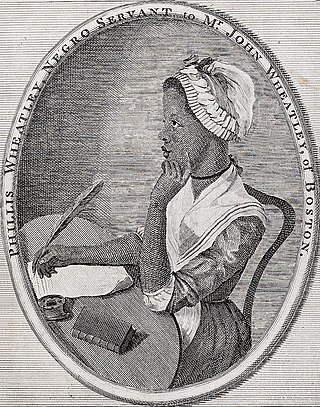
Phillis Wheatley Peters, also spelled Phyllis and Wheatly was an American author who is considered the first African-American author of a published book of poetry. Born in West Africa, she was kidnapped and subsequently sold into slavery at the age of seven or eight and transported to North America, where she was bought by the Wheatley family of Boston. After she learned to read and write, they encouraged her poetry when they saw her talent.
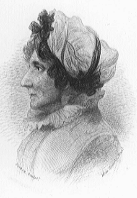
Anna Laetitia Barbauld was a prominent English poet, essayist, literary critic, editor, and author of children's literature. A prominent member of the Blue Stockings Society and a "woman of letters" who published in multiple genres, Barbauld had a successful writing career that spanned more than half a century.

Marianne Craig Moore was an American modernist poet, critic, translator, and editor. Her poetry is noted for its formal innovation, precise diction, irony, and wit. She was nominated for the 1968 Nobel Prize in Literature by Nobel Committee member Erik Lindegren.
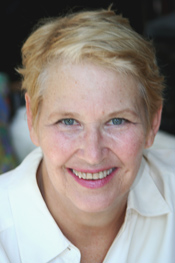
Annie Dillard is an American author, best known for her narrative prose in both fiction and non-fiction. She has published works of poetry, essays, prose, and literary criticism, as well as two novels and one memoir. Her 1974 novel Pilgrim at Tinker Creek won the 1975 Pulitzer Prize for General Nonfiction. From 1980, Dillard taught for 21 years in the English department of Wesleyan University, in Middletown, Connecticut.

Amy Lawrence Lowell was an American poet of the imagist school, which promoted a return to classical values. She posthumously won the Pulitzer Prize for Poetry in 1926.

Charlotte Smith was an English novelist and poet of the School of Sensibility whose Elegiac Sonnets (1784) contributed to the revival of the form in England. She also helped to set conventions for Gothic fiction and wrote political novels of sensibility. Despite ten novels, four children's books and other works, she saw herself mainly as a poet and expected to be remembered for that.
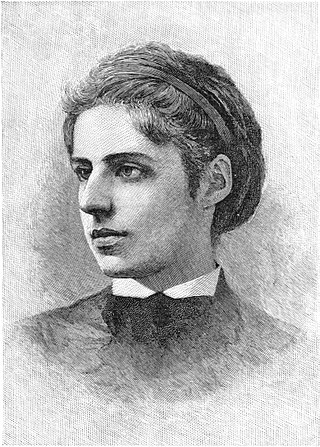
Emma Lazarus was an American author of poetry, prose, and translations, as well as an activist for Jewish and Georgist causes. She is remembered for writing the sonnet "The New Colossus", which was inspired by the Statue of Liberty, in 1883. Its lines appear inscribed on a bronze plaque, installed in 1903, on the pedestal of the Statue of Liberty. Lazarus was involved in aiding refugees to New York who had fled antisemitic pogroms in eastern Europe, and she saw a way to express her empathy for these refugees in terms of the statue. The last lines of the sonnet were set to music by Irving Berlin as the song "Give Me Your Tired, Your Poor" for the 1949 musical Miss Liberty, which was based on the sculpting of the Statue of Liberty. The latter part of the sonnet was also set by Lee Hoiby in his song "The Lady of the Harbor" written in 1985 as part of his song cycle "Three Women".
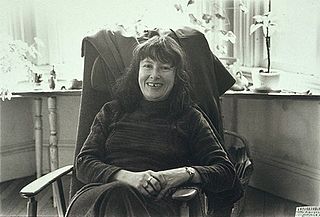
Priscilla Denise Levertov was a British-born naturalised American poet. She was a recipient of the Lannan Literary Award for Poetry.

Alice Christiana Gertrude Meynell was a British writer, editor, critic, and suffragist, now remembered mainly as a poet.
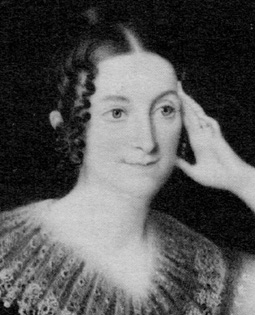
Lydia Huntley Sigourney, néeLydia Howard Huntley, was an American poet, author, and publisher during the early and mid 19th century. She was commonly known as the "Sweet Singer of Hartford." She had a long career as a literary expert, publishing 52 books and in over 300 periodicals in her lifetime. While some of her works were signed anonymously, most of her works were published with just her married name Mrs. Sigourney. During the lyceum movement that flourished in the United States in the 19th century, women named literary societies and study clubs in her honor.

Mary Jane Oliver was an American poet who won the National Book Award and the Pulitzer Prize. She found inspiration for her work in nature and had a lifelong habit of solitary walks in the wild. Her poetry is characterized by a sincere wonderment and profound connection with the environment, conveyed in unadorned language and simple yet striking imagery. In 2007, she was declared to be the country's best-selling poet.
Anne Steele was an English Baptist hymnwriter and essayist. For a full century after her death, she filled a larger place in United States and British hymnals than any other woman.
Naomi Long Madgett was an American poet and publisher. Originally a teacher, she later found fame with her award-winning poems and was also the founder and senior editor of Lotus Press, established in 1972, a publisher of poetry books by black poets. Known as "the godmother of African-American poetry", she was the Detroit poet laureate since 2001.

Caroline Howard Gilman was an American author. Her writing career spanned 70 years and included poems, novels, and essays.

Poems on Various Subjects, Religious and Moral by Phillis Wheatley, Negro Servant to Mr. John Wheatley, of Boston, in New England is a collection of 39 poems written by Phillis Wheatley, the first professional African-American woman poet in America and the first African-American woman whose writings were published.

And Still I Rise is author Maya Angelou's third volume of poetry, published by Random House in 1978. It was published during one of the most productive periods in Angelou's career; she had written three autobiographies and published two other volumes of poetry up to that point. Angelou considered herself a poet and a playwright, but was best known for her seven autobiographies, especially her first, I Know Why the Caged Bird Sings, although her poetry has also been successful. She began, early in her writing career, alternating the publication of an autobiography and a volume of poetry.

Maya Angelou, an African-American writer who is best known for her seven autobiographies, was also a prolific and successful poet. She has been called "the black woman's poet laureate", and her poems have been called the anthems of African Americans. Angelou studied and began writing poetry at a young age, and used poetry and other great literature to cope with trauma, as she described in her first and most well-known autobiography, I Know Why the Caged Bird Sings. She became a poet after a series of occupations as a young adult, including as a cast member of a European tour of Porgy and Bess, and a performer of calypso music in nightclubs in the 1950s. Many of the songs she wrote during that period later found their way to her later poetry collections. She eventually gave up performing for a writing career.
Maria Barrell née Weylar was a poet, playwright and writer of periodicals. Whilst confined in debtors' prison she wrote about the plight of bankruptcy and campaigned to Parliament for legislative reform. Having faced financial issues for much of her life, she died in Newgate Prison awaiting deportation to Australia.
Sarah Parsons Moorhead was an American poet, artist, and polemicist active during the Great Awakening in the 18th century. Her poems critique the itinerant ministers of the Great Awakening and demonstrate the emergence of women's voices during that time.
References
- ↑ Buck, Claire, ed. (1992). Bloomsbury guide to women's literature. United Kingdom: Bloomsbury Publishing. p. 882. ISBN 0-7475-0895-X – via The Internet Archive.
- 1 2 3 4 5 6 Levernier, James A.; Wilmes, Douglas R., eds. (1983). American writers before 1800 : a biographical and critical dictionary. United States: Greenwood Press. pp. 550–551. ISBN 0-313-23476-0 – via The Internet Archive.
- 1 2 3 4 5 6 7 Mulford, Carla; Vietto, Angela; Winans, Amy E., eds. (1999). American women prose writers to 1820. United States: Gale Research. pp. 119–121. ISBN 0-7876-1855-1 – via The Internet Archive.
- 1 2 3 4 5 Todd, Janet, M. (1987). A Dictionary of British and American women writers, 1660–1800. United States: Rowman & Littlefield. p. 123. ISBN 0-8476-7125-9 – via The Internet Archive.
{{cite book}}: CS1 maint: multiple names: authors list (link) - 1 2 Mainiero, Lina, ed. (1980). American women writers : a critical reference guide from colonial times to the present. United States: Frederick Ungar Publishing Company. pp. 23–24. ISBN 0-8044-3151-5 – via The Internet Archive.
- 1 2 3 Davidson, Cathy N.; Wagner-Martin, Linda; Ammons, Elizabeth; Harris, Trudier; Kibbey, Ann; Ling, Amy; Radway, Janice, eds. (1995). The Oxford companion to women's writing in the United States. United States: Oxford University Press. pp. 314–315. ISBN 0-19-506608-1 – via The Internet Archive.